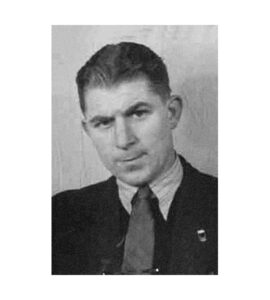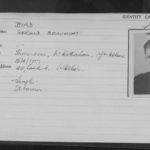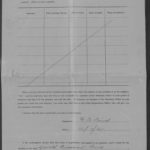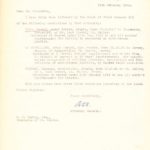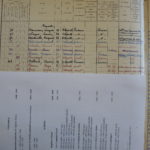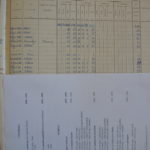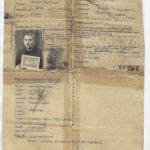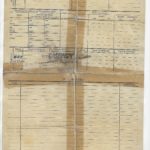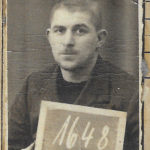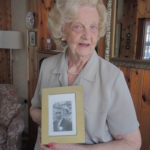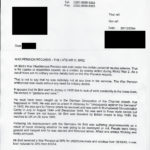Gerald Beaumont Bird
- Date of Birth: April 16, 1917
- Place of Birth: The United Kingdom
- Date of Deportation: 19440110
- Address when Deported: 20 Sand Street, St Helier, Jersey
- Place of deportation: Jersey
- Sites deported to: Alderney Gaol,
By Gilly Carr
Gerald Beaumont Bird was born in the mining village of Thurnscoe in Yorkshire on 16 April 1917 to Joseph Bird and Elizabeth Bird née Beaumont. His brother worked down the mines when he was old enough and Gerald was expected to do the same. He tried it for a while but found that he was not suited to it, nor it to him. Instead he went to Jersey in 1935, aged 18, to work on the land, picking potatoes, but also working as a gardener and, later, a driver. Why he chose Jersey is unknown, but the island would have offered a very different life to that of a mining village.
Gerald did not choose to evacuate from Jersey before the arrival of the Germans. As he was 23 years old in the spring of 1940, he would have been of fighting age, and we can assume that the prospect of joining the armed forces at that stage in his life did not appeal any more than working down the mines.
Gerald comes to our attention because, on 10 January 1944 and by now working as a motor driver, he was sentenced by the court of Field Command 515 to six months’ imprisonment for ‘failing to surrender an anti-German leaflet.’ In his compensation testimony, Bird described the anti-German leaflet as ‘propaganda’. It was, in fact, a leaflet he had got from Evelina Garland and comprised a satirical anti-German verse to the tune of ‘Bless ’em all‘, a WWI song made popular by George Formby in 1940. For more insight into this case, Garland’s entry in the Frank Falla Archive should be consulted.
What happened to him next to Gerald Bird can be reconstructed from three sources: papers contained in his claim file for compensation from Nazi persecution, most especially his testimony; records from the International Tracing Service; and information from his family.
Bird was sent to Alderney in the first instance. A letter within his compensation claim file from the Ministry of Pensions and National Insurance, dated April 1965, says that his sojourn in Alderney was for ‘compulsory employment’, but a letter from the Veterans Agency of the Ministry of Defence written in 2004, in the possession of his family, stated that he was sent to prison in Alderney. In his compensation testimony, Bird wrote that he was sentenced in Alderney in December 1943, although the court tribunal records indicate that this took place in Jersey, on 10 January 1944.
In January 1944 he was sent to France to ‘complete his sentence, which ended on 6 June 1944’, as Bird put it in his compensation testimony. He was sent to Saint-Lô Prison, and then to Lisieux Prison, ‘for propaganda purposes’, from 9 March to 6 June 1944. It is possible that other French prisons were involved before Lisieux, as Bird mentions that he was a ‘guest of several prisons’ before Lisieux. Bird is also referred to in a letter written by Patrick McCloskey in Saint-Denis internment camp as having been an inmate of this camp as late as 1 June 1944. As the records from many French prisons are missing, or were destroyed in bombing raids during the war, we do not have a full record of prison or camp registers to refer to. Therefore, in terms of his French prisons, we are reliant wholly on Bird’s testimony, which states that:
On approx. the 6th June 1944 a bomb was dropped near the prison [in Lisieux] which allowed several of the prisoners to escape, and myself, which I did. But later that evening I was caught by the Gestapo and that is where my troubles began. Although things were not too good during my sentence, they were much better than when I was picked up by the Gestapo, they questioned and beat me tied me up like a dog, and took me to a nearby airfield, where further questions were asked. In the middle of the night I was taken to a French jail, chained like a dog. On the following morning the 7th June 1944 I was collected by the Gestapo police, and was chained again, and taken to another prison, the name of [which] I cannot remember. I was there for about three days, kicked, questioned, kicked and beat again, and then with other prisoners, I was marched to a prison outside Paris, Fresnes. I arrived at the prison Fresnes about 3 days later which would be approximately the 12th June 1944, where further treatment occurred. I was in Fresnes for about 5 weeks, and at about the end of July 1944 I was sent to a concentration camp called Buchenwald.
Gerald Bird, compensation testimony of Nazi persecution, 4 March 1965.
It seems strange that Bird described his escape attempt from Lisieux in such detail, yet of Buchenwald he was to write remarkably little. It seems likely that he could not face the horror of describing this camp; he was certainly not the only applicant for compensation who said little about their experience. James Quick and Stanley Green who were in the same transport from Fresnes to Buchenwald with Bird, were similarly brief. All that Bird could write was:
I was there until November 29th 1944. I was released from Buchenwald in November and I was sent to Sagan Luft III.
Gerald Bird had arrived in Buchenwald on 20th August, a journey of five days in a sealed cattle truck, setting out from Paris (probably Fresnes prison) on 15 August 1944. On his arrival he was given prisoner number 78398. He stayed in the camp until 28 November 1944 (rather than 29 November, as Bird testified) and his card was marked ‘DIKAL’, or Darf in kein anderes lager, meaning ‘not to be transferred to another camp’. From his camp records we also learn that he arrived in Buchenwald on the orders of the BdS (the Commanders of Security Police, Befehlshaber der Sicherheitspolizei), among the highest Nazi security organisations in occupied countries. He was listed as a police prisoner in so-called ‘protective custody’, typical for prisoners who had served out their sentences but continued to remain in Nazi custody. It seems that escaping from Lisieux was, indeed, the place where his troubles began.
Although Bird did not leave a testimony about what happened to him during his time in Buchenwald, he mentioned several incidents to his family. From them we learn that his job was to remove ashes from the camp’s crematorium; that he’d seen both dogs and people hung in the camp; that he was beaten; that he was shut up in a confined place for telling the guards that they wouldn’t win the war; and that he was advised to keep his tattooed arms covered up as one of the guards had a reputation for targeting people with tattoos for skinning.
Despite his card being marked ‘DIKAL’, Bird was indeed moved out of Buchenwald to, as we have seen, the military POW camp of Sagan Luft III. Bird’s testimony ended here, but a letter from the Ministry of Pensions and National Insurance within his compensation claim file lists two other camps after Sagan Luft III, namely, Kreuzburg (Ilag VIII) (to which he was transferred on 2 December 1944) and Spittal in Austria (where he arrived on 29 January 1945). A number of civilians from Jersey were interned in both of these two civilian internment camps, and so we should not be surprised that he was moved out of a military POW camp to these particular places.
With regards to how Bird managed to get transferred out of Buchenwald after three hard months, three clues present themselves. The first is the group of 168 Allied airmen in Buchenwald, who arrived on the same transport as Bird. They left the camp as a group on 19 October 1944. Ten of their number who were ill stayed behind in the camp hospital (where treatment was rudimentary at the very best). These ill men left the camp at the same time as Bird. But why was he transported with them? Our second clue is some notes relating to his medical record while in Buchenwald, part of the camp records kept by the International Tracing Service. These show that he had a torn muscle in his arm on 2 November 1944 followed by influenza on 9 November. He was also given a series of three inoculations against dysentery and typhus after this date. We might couple the torn muscle with the testimony from his wife that Bird injured his hand while sawing wood. Rather than treating him, his two affected digits – the thumb and index finger of his left hand – were simply cut off, no doubt without anaesthetic or sterile equipment, and certainly without antibiotics, which in any case would not have been available then. Could the ‘influenza’ have actually been a fever caused by an infected hand?
Bird’s removal from the camp on 28 November 1944 might have been to do with the camp’s authorities’ desire not to be responsible for the death of an Englishman (and the vaccinations in the three weeks before his departure support this argument). It is possible that, as the last of the allied airmen left the camp, someone pleaded for the right to take a fellow allied national with them. His British nationality is certainly our third clue, and his removal from Sagan Luft III to a civilian internment camp four days after his arrival in the POW camp certainly seems to indicate that whatever factors were in play in getting him out of the camp, those same factors were responsible for getting him to Kreuzburg to be with a number of other men deported from Jersey. Could Bird, like Stanley Green and Bill Symes, have smuggled a letter out of the camp which eventually succeeded in getting him transferred out of Buchenwald? This is not beyond the realms of possibility, because those deported to Kreuzburg left Jersey in February 1943 and Bird did not leave the island until December 1943 / January 1944. He could well have had friends in the camp with whom he corresponded before leaving Jersey.
Because Bird finished his testimony at Sagan Luft III, the next stage to his story is narrated by his wife, Audrey, who he met in 1948 at a dance in Hounslow. They married in 1951 and had a son. Audrey testified that her husband was not a well man when she met him and that he had been in hospital for a long time in Sheffield, where he was kept sedated. While in hospital he had been ‘denied a pyjama cord or a knife and fork because of his mental state’, although he recovered well. He had to be careful about what he ate because he had ‘lost the lining of his stomach’ in the camp. He also had false teeth because all of his teeth were knocked out in Buchenwald.
After he was married, Gerald trained as a mechanic and got a job working as a civilian driver for the war office. With regards to his past, he gave his family to understand that he had been in the army, attached to the Argyll and Sutherland Highlanders regiment during the war, and had been captured and put in a military POW camp. On the day of his funeral, this version of events was repeated from the pulpit and only then did someone come forwards and inform his wife that this was not true and that he had been in a concentration camp.
Quite why Gerald Bird chose to give a different version of events to his family is unknown. Perhaps he was somehow ashamed at not joining the armed forces during the war and so he let them believe that he had. Perhaps it was easier to let them believe he had been only in a POW camp to deter questions. Maybe this was just a symptom of his PTSD. The 1965 letter from the Ministry of Pensions and National Insurance confirmed that Bird received a war pension ‘for the disabilities psychoneurosis and sciatica, as having been aggravated by detention … There has, however, been improvement in the condition of the accepted disabilities over the years and whereas the assessment of disabilities was 60 per cent in December 1945 it is now 30 per cent.’
A letter written in 2004 to Audrey Bird from the Veterans Agency said a little more about his PTSD after the war. ‘Following his imprisonment with the Germans, Mr Bird was suffering from psychoneurosis as a result of never knowing whether he was going to be destroyed or not. People were being gassed and hanged and he was starved and knocked about.’
Gerald Bird was successful in receiving compensation for his time in Buchenwald. He was not compensated for his period of imprisonment before that.
Sources
Gilly Carr would like to thank Audrey Bird, the wife of Gerald Bird, for her interview of 3 May 2014. She would also like to thank Jim Stewart, one of the 168 allied airmen who were in Buchenwald, and his friend Bryan Wilcockson, for their views and theories about Gerald Bird.
Court documents relating to Gerald Bird, Jersey Archives ref. D/Z/H6/7/37.
Gerald Bird’s compensation claim for Nazi Persecution, TNA ref. FO 950/2525.
Gerald Bird’s International Tracing Service records, Wiener Library, refs. 5387409#1, and 5544990 – 5545002.
Occupation registration card and forms, Jersey Archives ref. St H/4/8682.
Gerald Bird’s records from Lisieux Prison, Calvados Archives (Caen), ref. 1506 w 13.
The personal papers of the family of Gerald Bird.
Further Information
- Gerald Bird compensation claim for Nazi Persecution, TNA ref. FO 950:2525. Contains public sector information licenced under the Open Government Licence v3.0.
- Record showing the presence of Gerald Bird in Buchenwald. Copyright International Tracing Service, Wiener Library, ref. 5387409#1.
- Gerald Bird’s Buchenwald camp records, copyright International Tracing Service, Wiener Library, refs. 5544990 – 5545002.
Map
- Cemetery / Mass Grave
- Concentration Camp
- Forced Labour Camp
- Prison
- Worksite / Fortification
